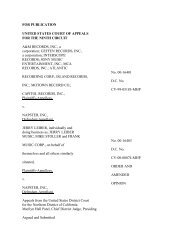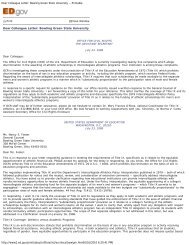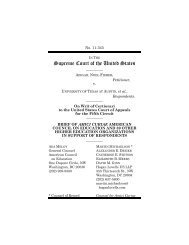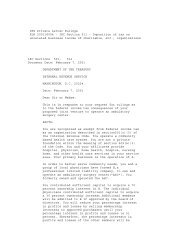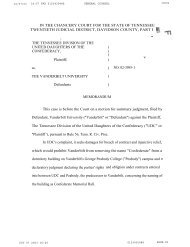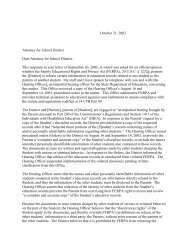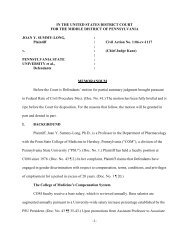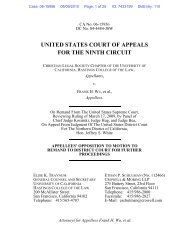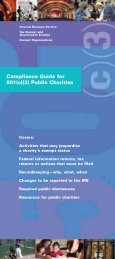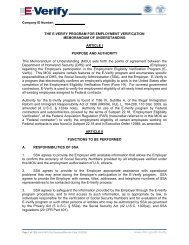Gross v. Family Services Agency, INC., et al.
Gross v. Family Services Agency, INC., et al.
Gross v. Family Services Agency, INC., et al.
You also want an ePaper? Increase the reach of your titles
YUMPU automatically turns print PDFs into web optimized ePapers that Google loves.
IN THE DISTRICT COURT OF APPEAL OF THE STATE OF FLORIDAFOURTH DISTRICT JANUARY TERM 1998B<strong>et</strong>hany Jill <strong>Gross</strong>, Appellantv.<strong>Family</strong> <strong>Services</strong> <strong>Agency</strong>, Inc., a Florida Corporation, and Nova Southeastern University, Inc., aFlorida corporation, Not-for-Profit, AppelleesCase No. 97-1335Opinion filed May 20, 1998Appe<strong>al</strong> from the Circuit Court for the Seventeenth Judici<strong>al</strong> Circuit, Broward County;Harry G. Hinkle, Jr., Judge; L.T. Case No., 95-1668608.Edna L. Caruso of Caruso, Burlington, Bohn & Compiani, P.A., West P<strong>al</strong>m Beach, andTod Arnovitz of Arnovitz & Associates, Miami, for appellant.Justin M. Senior and Bartley C. Miller of Panza, Maurer, Maynard & Neel, P.A., FortLauderd<strong>al</strong>e, for Appellee-Nova Southeastern University, Inc.STEVENSON, J.Appellant, B<strong>et</strong>hany Jill <strong>Gross</strong>, a graduate student attending Nova Southeastern University,appe<strong>al</strong>s a Fin<strong>al</strong> Summary Judgment concluding that Nova had no duty to take precautions againsta crimin<strong>al</strong> attack she suffered at a mandatory, off-campus internship site. We reverse.The Facts (as <strong>al</strong>leged in the sworn affidavits and other record evidence)Appellant moved to Fort Lauderd<strong>al</strong>e from North Carolina to study at Nova SoutheasternUniversity in the doctorate psychology program. As part of the curriculum, she was required tocompl<strong>et</strong>e an eleven-month internship, c<strong>al</strong>led a “practicum.” Nova provides each student with <strong>al</strong>isting of the approved practicum sites, compl<strong>et</strong>e with a description of the type of experienceoffered at each site. Each student selects six internships from the list and is placed, by Nova, atone of the selected sites. In April of 1995, appellant, then twenty-three years old, was assigned to<strong>Family</strong> <strong>Services</strong> <strong>Agency</strong>, Inc. (“FSA”), which was one of her six selections.FSA is located about fifteen minutes away from Nova in an area which appellantcharacterized as a “bad neighborhood.” Appellant’s practicum sessions som<strong>et</strong>imes took place inthe evening, and the lighting in FSA’s parking lot was “poor.” On October 3, 1995, appellant leftFSA at around 8:00 p.m. She had just started her car when a man tapped on her window with a
gun. Pointing the weapon at her head, the man had appellant roll down the window. He thentook her money and jewelry. The man had appellant slide over into the passenger seat. He thendrove a short distance, where he proceeded to sexu<strong>al</strong>ly assault appellant in the back seat of hervehicle. Eventu<strong>al</strong>ly, after driving around some more, the man l<strong>et</strong> appellant go and drove off in hercar. The perp<strong>et</strong>rator was apprehended and convicted of this series of crimes.As it turns out, in April of 1995--the same month appellant began her practicum--BruceW<strong>al</strong>lin, the director of FSA, was himself accosted in FSA’s parking lot in broad daylight by aknife-carrying man. After his own attack, Mr. W<strong>al</strong>lin felt there was a “significant risk” that othersuch crimes would occur. FSA disclosed Mr. W<strong>al</strong>lin’s incident to Dr. Katell, Nova’s coordinatorof student internships. In response, Nova did not inquire wh<strong>et</strong>her the April attack was an isolatedincident or wh<strong>et</strong>her it required further investigation.At the time of her own attack six months later, appellant was aware that Mr. W<strong>al</strong>lin hadpreviously been assaulted, but she was unaware of any other confirmed crimin<strong>al</strong> activity in thearea. In actu<strong>al</strong>ity over the years, FSA has been the site of a burglary, numerous instances oftrespass, and various thefts and break-ins of automobiles. It is <strong>al</strong>so suspected that drugtransactions are commonly conducted at a convenience store right across the stre<strong>et</strong> from FSA. Atno time did FSA employ a security guard, nor did it contract with a security company.Appellant subsequently filed this action against both FSA and Nova. Appellant eventu<strong>al</strong>lys<strong>et</strong>tled with FSA. The complaint <strong>al</strong>leges that Nova breached its duty to “exercise reasonable carefor the saf<strong>et</strong>y of its students and provide a safe and secure education<strong>al</strong> environment on its campusand affiliated areas.” Nova later moved for summary judgment, arguing that it had no duty totake precautions against a third-party crimin<strong>al</strong> attack at FSA. The tri<strong>al</strong> court granted Nova’smotion, finding no duty on Nova’s beh<strong>al</strong>f, stating that Nova “did not own, operate, or control thepremises where plaintiff was abducted and later assaulted.” This appe<strong>al</strong> followed.Not a premises liability caseIt seems evident that the tri<strong>al</strong> court decided this case on the basis of premises liability.However, as appellant pointed out both below and on appe<strong>al</strong>, “this is not a premises liabilitylawsuit.” This case does not involve a dangerous condition on or emanating from Nova’spremises which is <strong>al</strong>leged to have caused appellant harm. Nor is appellant’s lawsuit based solelyon a claim that Nova had some gener<strong>al</strong> obligation to control the premises of FSA. The issue, asappellant has framed her lawsuit, is wh<strong>et</strong>her a “speci<strong>al</strong> relationship” exists b<strong>et</strong>ween Nova andherself such that Nova had a duty to take reasonable precautions against foreseeable crimin<strong>al</strong> actsat appellant’s internship site.“Speci<strong>al</strong> relationships”While a person gener<strong>al</strong>ly has no duty to take precautions to protect another againstcrimin<strong>al</strong> acts of third parties, see Boynton v. Burglass, 590 So. 2d 446 (Fla. 3d DCA 1991),exceptions to this gener<strong>al</strong> rule have emerged. Wh<strong>et</strong>her a duty arises in any particular context isresolved as a matter of law, after weighing “the sum tot<strong>al</strong> of those considerations of policy whichlead the law to say that the particular plaintiff is entitled to protection.” See Rupp v. Bryant, 417So. 2d 658, 667 (Fla. 1982) (quoting W. Prosser, The Law of Torts § 53 at 325-26 (4th ed.
1971)). Pursuant to this b<strong>al</strong>ancing of policies, various “speci<strong>al</strong> relationships” have been identified,inherent in which is a duty to take reasonable precautions against foreseeable third-party crimin<strong>al</strong>acts. See Restatement (Second) of Torts §§ 314, 315 (1965); see <strong>al</strong>so C.D. Sumner, Annotation,Private Person’s Duty and Liability for Failure to Protect Another Against Crimin<strong>al</strong> Attack byThird Person, 10 A.L.R.3d 619 (1967). Among the recognized “speci<strong>al</strong> relationships” are1 2 3 4employer-employee ; landlord-tenant ; landowner-invitee ; and school-minor student. Weconclude that, at least under the circumstances of this case, the university-adult studentrelationship must be placed <strong>al</strong>ongside these recognized speci<strong>al</strong> relationships.In deciding wh<strong>et</strong>her the university-adult student relationship gives rise to a duty on theuniversity’s part to take precautions for a student-intern’s saf<strong>et</strong>y, we begin with the wellestablishedprinciple that, “at least through the high school level,” a school “undoubtedly owes agener<strong>al</strong> duty of supervision to the students placed within its care.” See Rupp, 417 So. 2d at 666.With this “gener<strong>al</strong>” duty in mind, Rupp held that a high school could be found negligent for failingto adequately supervise a school-sanctioned student group during an extra-curricular, offpremiseshazing ceremony which left a student permanently par<strong>al</strong>yzed. See id.We believe that the broad “gener<strong>al</strong>” duty of supervision described in Rupp is unwarrantedat the university level. “The genesis” of Rupp’s supervisory duty is that high school employeesstand “parti<strong>al</strong>ly in place of the student’s parents.” Id. This reasoning does not carry over into theuniversity context where students are adults. Even so, we need not impose a “gener<strong>al</strong>” duty ofsupervision upon Nova to find that it had a duty in the limited context of this case. Here, we arefaced with the scenario of a student participating in a university-mandated internship program at asite specific<strong>al</strong>ly approved and suggested by the university. In this circumstance, we hold that a“speci<strong>al</strong> relationship” exists b<strong>et</strong>ween Nova and its interning students such that Nova has a duty totake reasonable precautions against foreseeable and unreasonable risks of injury associated withthe internship sites.Shurben v. Dollar Rent-A-Car, 676 So. 2d 467 (Fla. 3d DCA 1996), demonstrates thatFlorida courts have been especi<strong>al</strong>ly sensitive in finding the requisite speci<strong>al</strong> relationship to exist.There, the Third District found that the plaintiff, a British tourist who was shot while vacationingin Miami, stated a cause of action against a car rent<strong>al</strong> company for failing to warn her about the1See Lillie v. Thompson, 332 U.S. 459, 460 (1947), where the Supreme Court, applyingtradition<strong>al</strong> negligence principles, held that an employer could be liable for a crimin<strong>al</strong> attack on afem<strong>al</strong>e employee after he “sen[t] her to work in a place he knew to be unsafe.” The employer hadreason to know that “dangerous characters” frequented the area, y<strong>et</strong> he had the plaintiff workthere throughout the night without taking reasonable measures to protect her. Id.1991).2See Schmidt v. Towers Constr. Co. of Panama City, 584 So. 2d 630 (Fla. 1st DCA3 See Hill v. City of North Miami Beach, 613 So. 2d 1356 (Fla. 3d DCA 1993).4 See Rupp v. Bryant.
isk of crime in certain areas. The court relied exclusively on section 302B of the Restatement(Second) of Torts, which provides:An act or omission may be negligent if the actor re<strong>al</strong>izes or should re<strong>al</strong>ize that it involvesan unreasonable risk of harm to another through the conduct of the other or a thirdperson which is intended to cause such harm, even though such conduct is crimin<strong>al</strong>.Id. at 468 (emphasis added).If the relationship in Shurben gives rise to at least a duty to warn of crimin<strong>al</strong> attacks, therelationship in this case does no less. Unlike the plaintiffs in Shurben, who could have drivenanywhere they chose, appellant was required by Nova to travel to a designated location as aprerequisite to compl<strong>et</strong>ing her degree. The much closer relationship in this case justifies theimposition of a duty beyond a mere duty to warn; specific<strong>al</strong>ly, we hold that Nova had a duty totake reasonable precautions to protect appellant from unreasonable risks of harm, includingreasonably foreseeable crimin<strong>al</strong> attacks at FSA. Wh<strong>et</strong>her Nova breached this duty is a questionfor the jury to ultimately decide. See Jones v. Florida Power & Light Co., 552 So. 2d 284, 286(Fla. 4th DCA 1989).REVERSED and REMANDED for further proceedings.GLICKSTEIN and DELL, JJ., CONCUR.NOT FINAL UNTIL THE DISPOSITION OF ANY TIMELY FILED MOTION FOR REHEARING.



